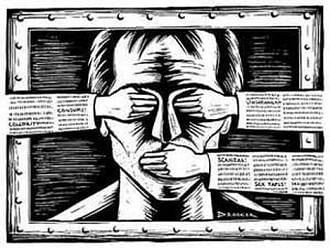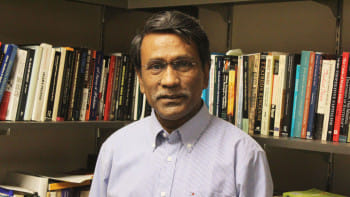The Broadcast Policy: A euphemism for media control

FREEDOM of thought and conscience is guaranteed under Article 39 of the Constitution. However, the right of every citizen to freedom of speech and expression and freedom of the press is guaranteed subject to any reasonable restrictions imposed by law in the interests of the security of the State, friendly relations with foreign states, public order, decency or morality, or in relation to contempt of court, defamation or incitement to an offence. The question is, does the newly proposed National Broadcast Policy impose more than 'reasonable restrictions' in the way of freedom of expression and the bounden duty of the media to criticise the government and inform the public, or otherwise.
Going by the available details of the draft policy recently approved by the cabinet, the new Policy is likely to be more of an encumbrance than a facilitator. The way some of the caveats are laid out one is reminded of the fear expressed by Ben Franklin related to the print media that if all printers were determined not to print anything till they were sure it would offend nobody, there would be very little printed.
It must be stated before taking on some of the aspects of the Policy that while it is true that society will suffer without an unfettered media, that freedom only extends up to where the other guy's nose begins. It is my belief that the electronic media, for whom this Policy has been devised, is very well aware of that fact. And to my mind there have been very few transgressions of that freedom by the electronic media. Some of the TV channels have been highly critical of the government of the day. And that is the job of the media, which, according to Orwell, is to oppose and criticise.
On the other hand, it has been, unfortunately, effort of governments to circumscribe that freedom under various pretexts, not least of all the pretext of national security. I cannot recall in very recent times that any section of the electronic media had deliberately spewed out matters that had proved injurious to the security of the country. And any such transgression could well have been addressed under existing laws. And I am quite confident that the private TV and radio channels have their own policy guidelines that generally conform to a universally acceptable norm of behaviour.
No doubt institutions need policies to operate. However, that should facilitate rather than hamper the performance of the media. And when the government seeks to define the work procedures of the media or a segment of it, through a policy, one can be forgiven for thinking that to be an effort to regulate the media.
Apart from putting the cart before the horse, by formulating the policy before setting up the broadcasting commission, the Policy itself is imprecise, confusing (Code, Code of Guidance, Charter of Duties, Disclosure Policy) and opens itself to misinterpretation, not to say misuse.
The very first section of the operative paragraph (Section-3) is self contradictory. It calls for objectivity, principles, impartiality and responsibility on the part of the electronic media. There is no scope of impartiality, which to me means remaining equidistance with regard to a particular issue, in journalism. The media has to be closer to the truth, closer to the good rather than maintain equidistance between the right and the wrong, and it cannot be responsibly performing its duty if it cannot expose the facts. It must call a spade a spade, and if that goes against the government and its policies, so be it. By the way, could one ask if the requirement of 'impartiality' will be applicable to the BTV?
And why are some sections of the government agencies being made a holy cow? Would that these restrictions were in force before May this year could the involvement of a few black sheep in Rab in the gruesome seven murder case have been exposed? And would that this policy was in vogue prior to February 25, 2009, could the country have known the extent of the BDR massacre. Admittedly, many of the TV journalists were not mentally equipped to cover that situation but what evil did the projection of the mutiny on the electronic media bring to the country? If anything, it helped the government to tackle the situation.
The media needs freedom to flourish as much as a fish needs water to survive. And even if policies are needed to operate it cannot become a diktat, because then 'policy' becomes a euphemism for restraint and censorship. It would do well if a broadcasting commission, independent in the strictest sense, was set up and entrusted with the task of formulating guidelines to help, not restrain the functioning of the electronic media.
The writer is Editor, Oped and Defence & Strategic Affairs, The Daily Star.

 For all latest news, follow The Daily Star's Google News channel.
For all latest news, follow The Daily Star's Google News channel. 



Comments